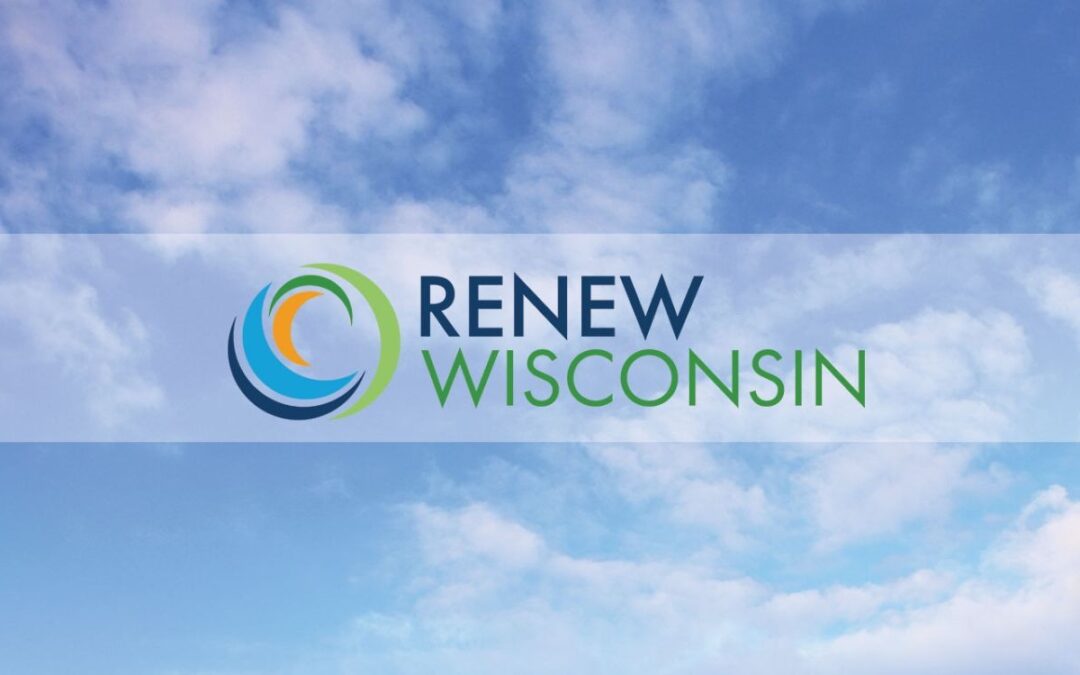
by Michael Vickerman | Sep 30, 2022 | Community Solar, RENEW Wisconsin, Renewables, Solar
After much internal deliberation, RENEW Wisconsin decided to end its 28-year membership in Customers First! Coalition (CFC). RENEW was a founding member of CFC, an organization whose diverse membership supported a balanced approach to shaping Wisconsin’s energy policy. For many years, RENEW’s participation in CFC yielded positive results in the form of legislation that served to drive utility investments in renewable generation, such as the state’s Renewable Portfolio Standard. However, as renewable energy technology and economics have advanced, we have had growing differences in various State policies that would allow utility customers to expand their renewable energy options. Because of this, RENEW Wisconsin felt we could no longer support many of the official positions of the CFC, and it was necessary to withdraw as a member.
RENEW sent a letter on September 28 informing CFC Directors of our decision to exit the coalition, listing three of the latest high-priority policy initiatives that RENEW supports and CFC opposes:
- Policies to affirm 3rd party financing of behind-the-meter renewables;
- Expansion of community solar options to serve all Wisconsin customers; and
- Customer-sited solar generation supplying power to commercial electric vehicle charging stations.
In explaining our advocacy for policies that CFC finds objectionable, we pointed to the continuing evolution in technology and economics.
While RENEW acknowledges the many benefits that Wisconsin energy consumers derive from effective utility regulation, it is crucial that our regulatory framework remain responsive to the ongoing evolution in renewable energy technology and economics. Distributed energy resources today can deliver a level of savings and operational flexibility to customers that were considered unthinkable 15 years ago. If Wisconsin is serious about clearing pathways for such beneficial electrification technologies as solar and storage, electric vehicle charging, heat pumps, and community solar, it must update and clarify the utility regulations that presently hinder customers from pursuing those options.

by Jodi Jean Amble | May 25, 2022 | Community Solar, Events, Geothermal, Local Initiatives, RENEW Wisconsin, Solar
On Sunday, May 22, RENEW Wisconsin, with presenting sponsor, Xcel Energy, hosted the 9th Annual “Ride with RENEW” bike ride fundraiser in Eau Claire, WI. Starting at Carson Park, the 16-mile route featured the Chippewa River State Trail and Lakeshore Trail. Over 20 riders enjoyed a chilly spring day pedaling and learning about the innovative renewable energy installations powering Eau Claire, Wisconsin.
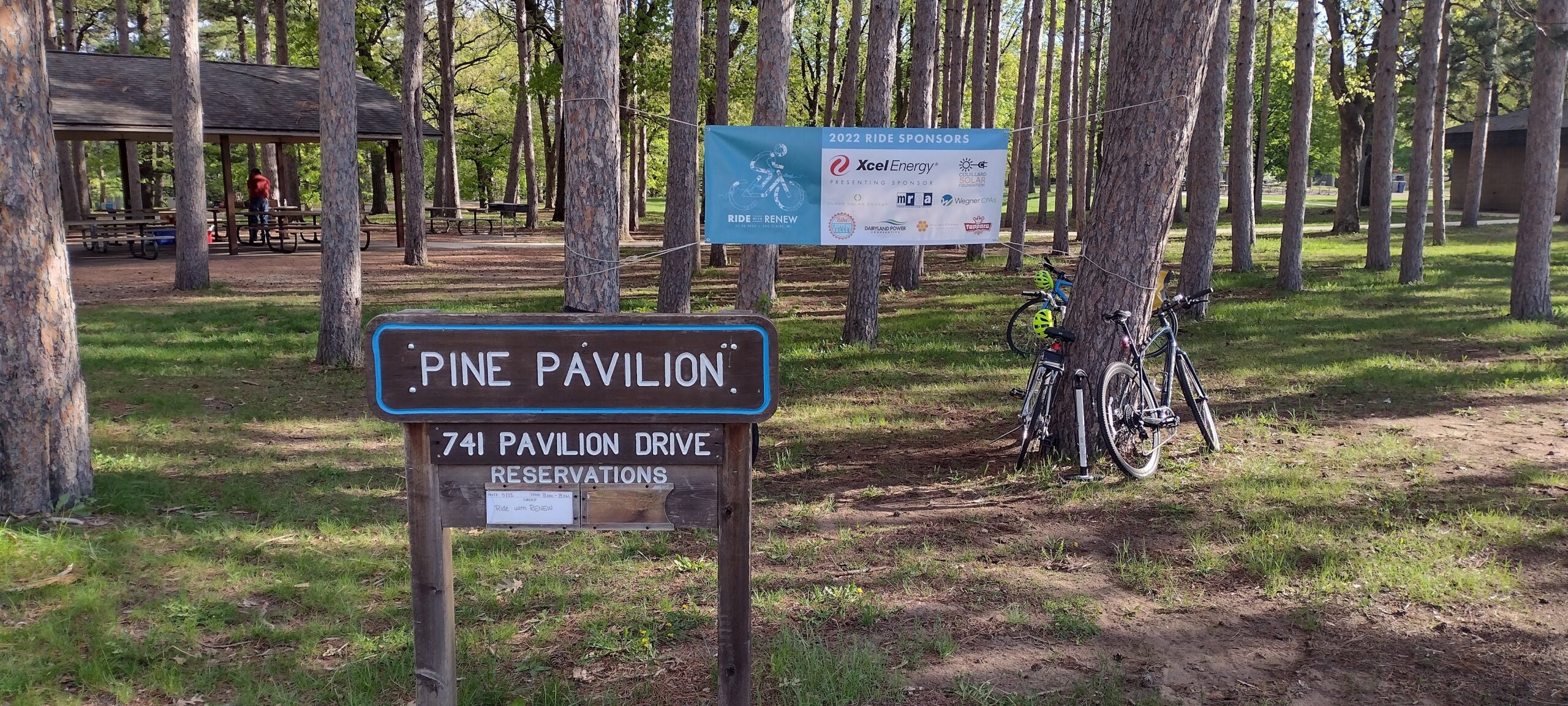
The first stop of the 2022 tour was Solar Forma. Brian Graff showed riders the company’s unique solar designs, including E-cacia trees, their signature product. Solar Forma wants to expand its solar designs to include a solar “wave” carport with electric vehicle charging.
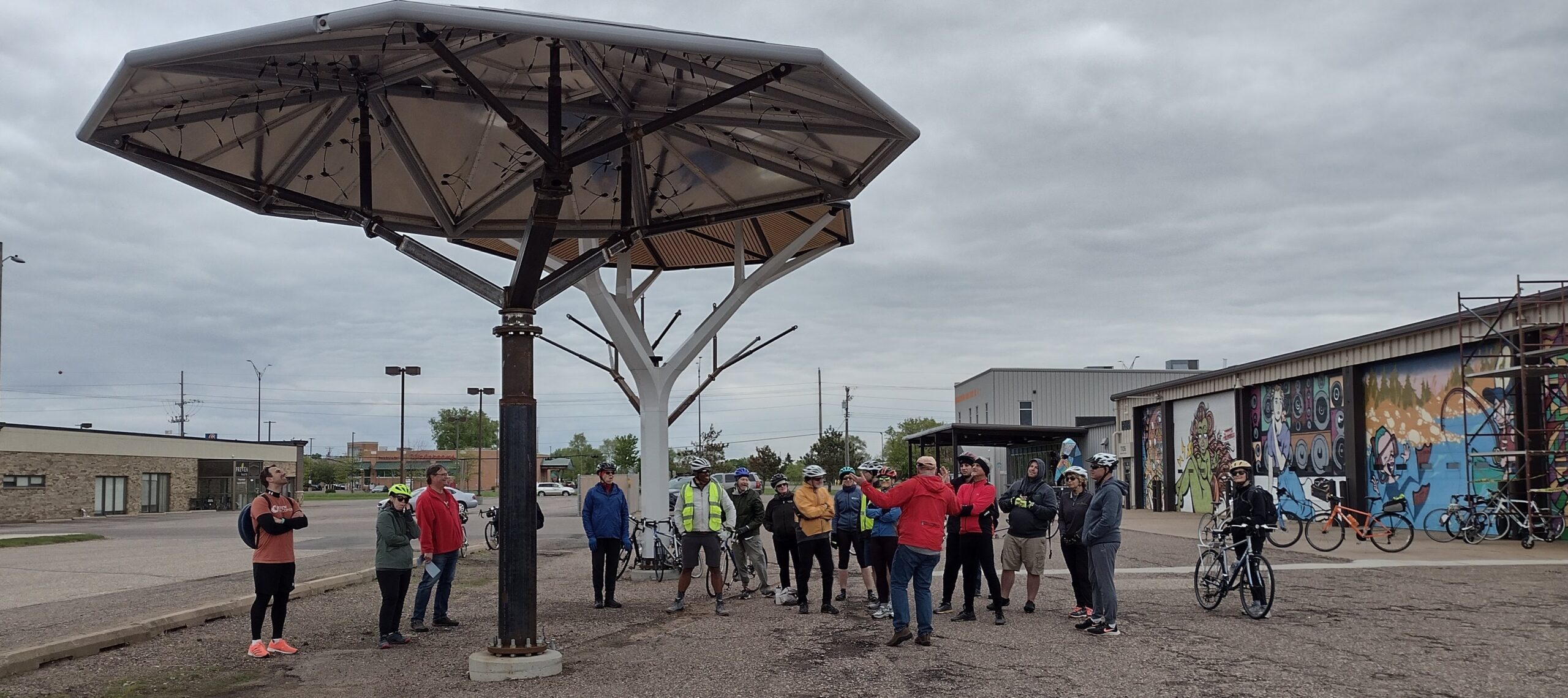
Next, riders visited Xcel Energy’s Sky Park Solar Garden. Julie Thoney and Zeus Stark provided an up-close look at the 1MW community solar garden at Sky Park, and riders also learned about Xcel’s three other Wisconsin community solar gardens. Xcel was the first investor-owned utility in the country to propose a net-zero carbon goal. They’re looking to expand their renewable portfolio in all operating states, including Wisconsin.
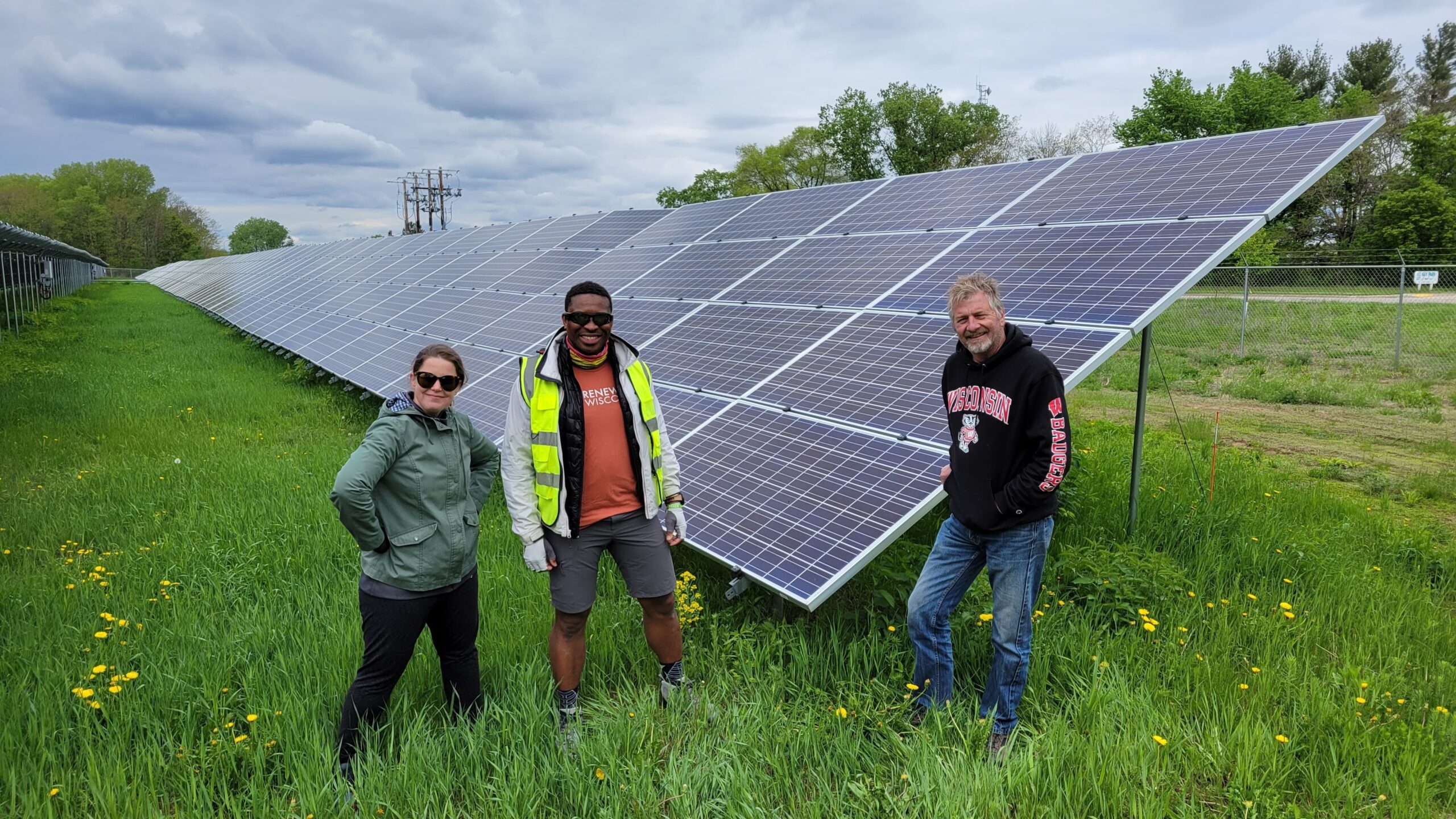
The next stop on the ride was Chippewa Valley Technical College (CVTC) Energy Education Center. Adam Wehling and Zeus Stark showed riders a variety of renewable energy generation sources on display, including several solar layouts and multiple small wind turbines, which is the same equipment CVTC uses in their class lessons. Riders also heard from Claire Lindstrom from the Couillard Solar Foundation about their work to make solar more accessible to public schools and mission-based organizations throughout the state. The Couillard Solar Foundation supplied 80 kilowatts of solar panels to CVTC, which provides approximately 40% of the electricity consumed at the Energy Education Center.
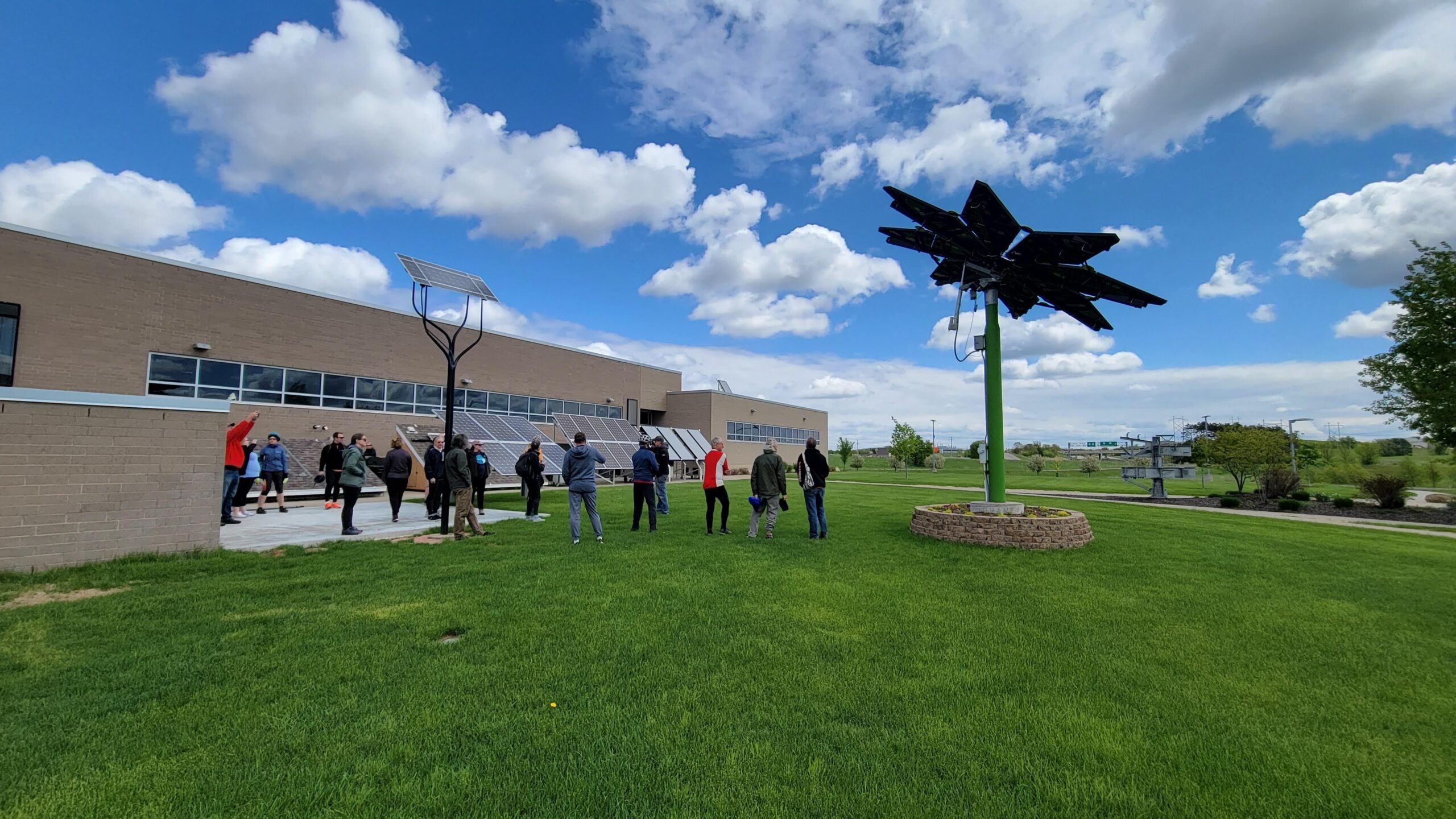
The final stop of the 2022 Ride was the home of long-time friend and former board member of RENEW, Ellen Terwilliger. Over the last decade, Ellen and her husband Steve installed four geothermal wells for heating and 15 kilowatts of solar PV, offsetting around 80% of their energy needs. The property also contains electric-vehicle charging, native prairie grasses, and several rain barrels. The Terwilligers even removed and reinstalled a south-facing rooftop to optimize their solar panels!
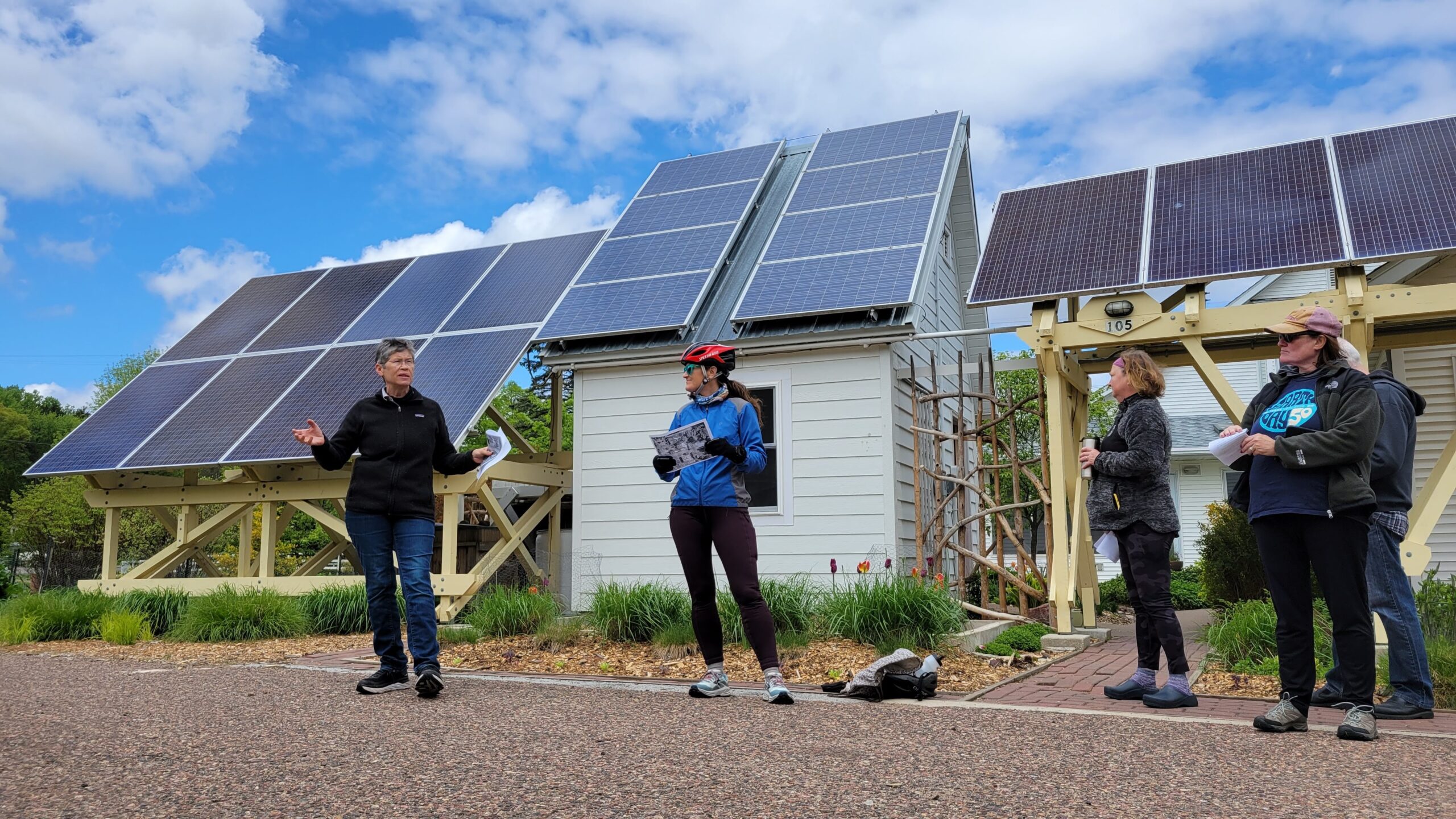
Our 2022 Ride with RENEW ended back at Carson Park with Toppers pizza and a brief address from Jim McDougall discussing his work to install solar on Eau Claire schools. Thanks to Eau Claire, local Ride leader Jeremy Gragert, and all of our riders, donors, and sponsors. Stay tuned for information on our 2023 Ride!
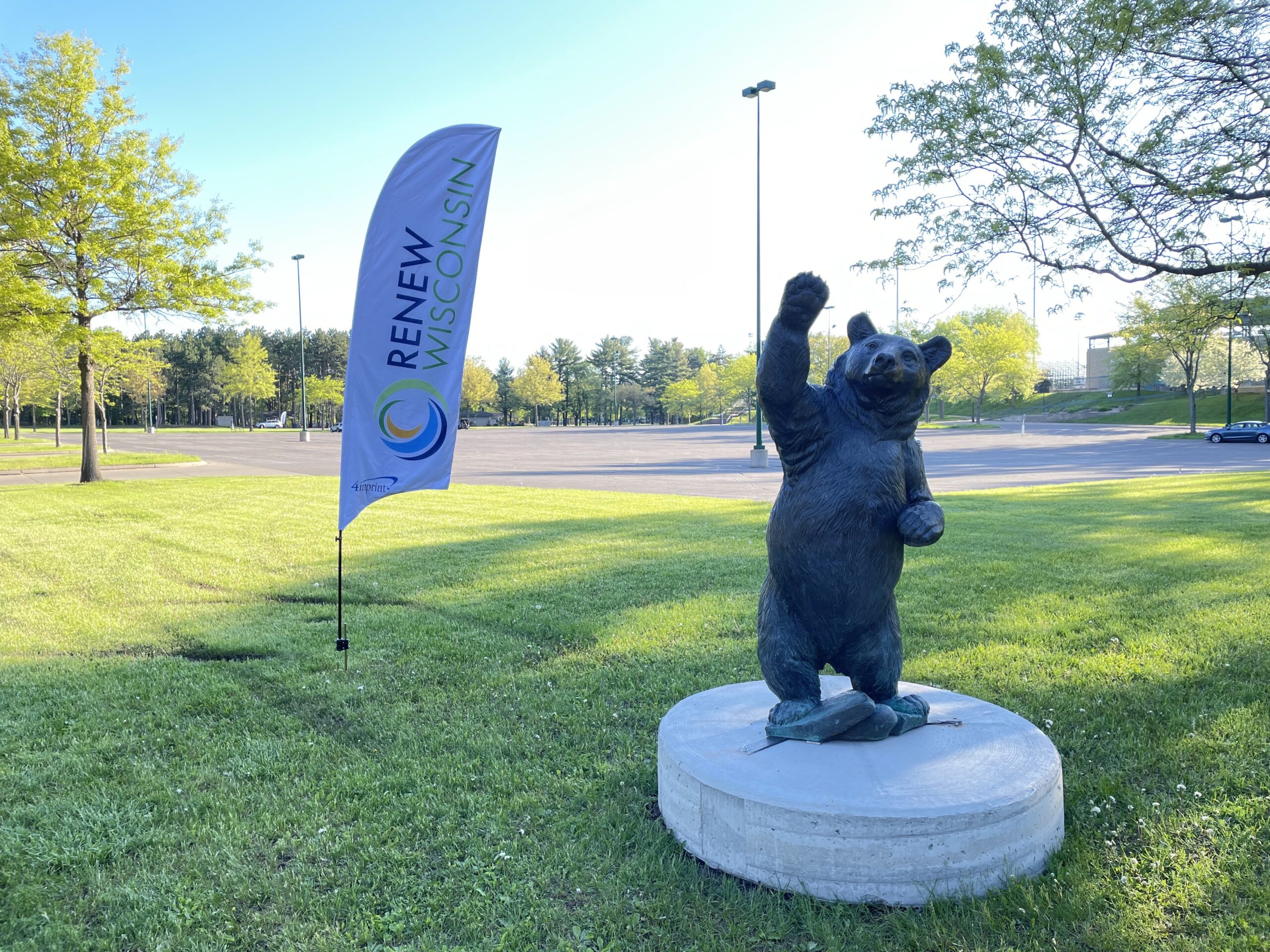
2022 RIDE WITH RENEW SPONSORS
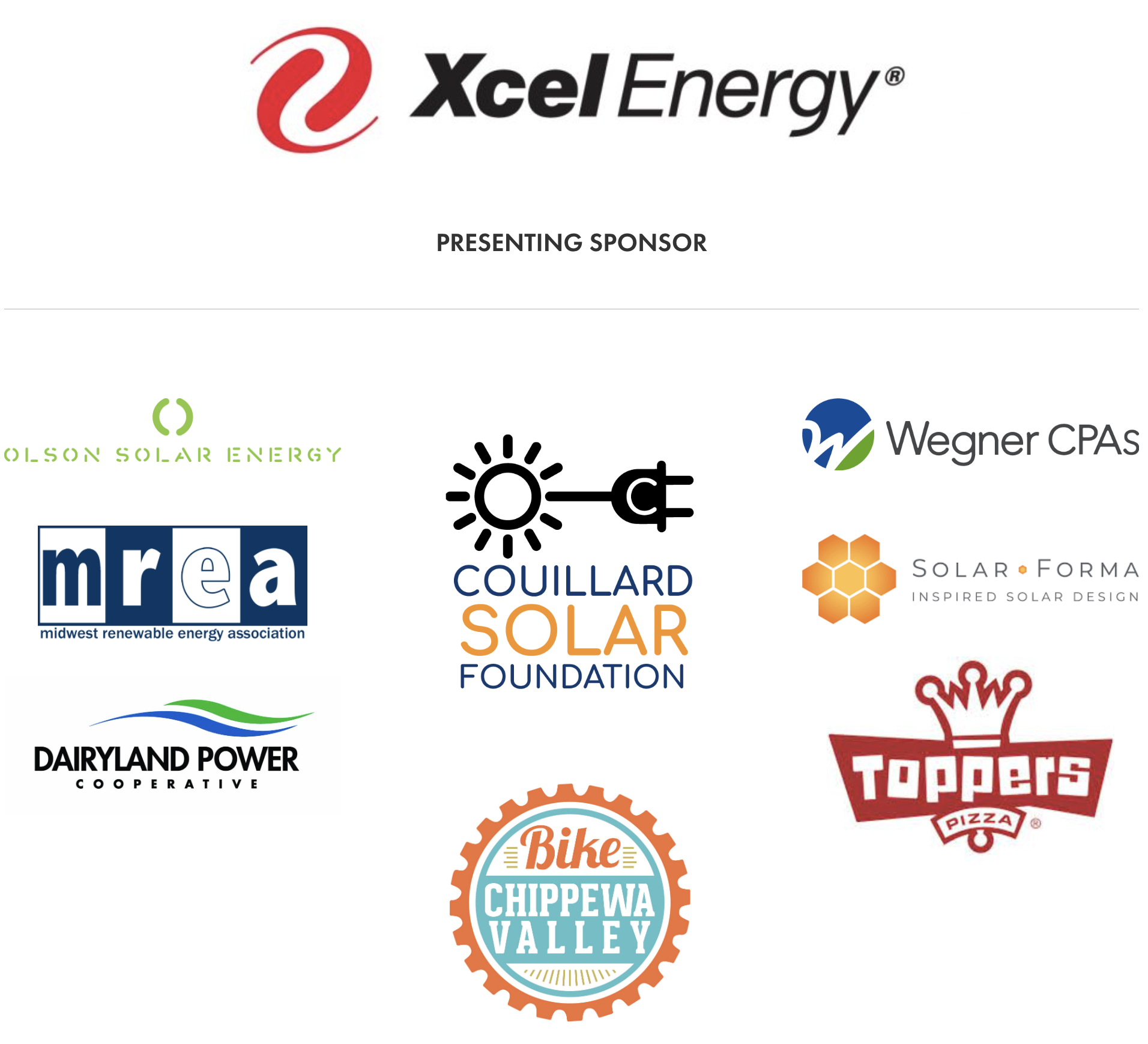

by Guest Blog | May 23, 2022 | Community, Community Solar, Solar
Cory Neeley
Director, SolarShare WI Cooperative
This year’s theme for Earth Day was “Invest In Our Planet.” There are many ways to invest in our planet, and I’m excited to announce a brand-new opportunity created in part by RENEW that allows everyday people to invest in Wisconsin’s clean energy economy.
SolarShare WI Cooperative is an innovative cooperative model that helps Wisconsin residents and businesses invest in solar cooperative farms. Working together, our members pool money to invest in solar farms located in Wisconsin, reducing our reliance on imported fossil fuels and strengthening our economy with stable, affordable, renewable energy for our local utilities.
How does SolarShare WI Cooperative Work?
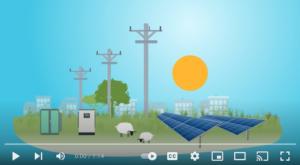
SolarShare WI Cooperative works with Wisconsin-based member contractors to finance, build, operate and maintain the cooperative solar farms, creating family-supporting jobs in Wisconsin and reducing our reliance on energy from outside the state. Profits from the sale of our clean energy are returned to members as dividends, multiplying the economic benefit of our projects.
Cooperative action is woven into the fabric of rural Wisconsin and allows small groups of people to achieve great things. Whether pooling dairy or providing electricity, cooperatives play crucial roles in Wisconsin communities.
Wisconsin imports 14 billion dollars’ worth of non-renewable energy each year. We can keep more of our energy dollars in Wisconsin by working together to invest in local renewable energy.
We plan to build solar farms across the state, partnering with local communities and utilities to provide cost-effective renewable energy while providing financial opportunities to Wisconsin citizens and ratepayers. The investment we make in cooperative solar farms is an investment in our state and, ultimately, our planet.
Please join us at SolarShare WI Cooperative for more information.
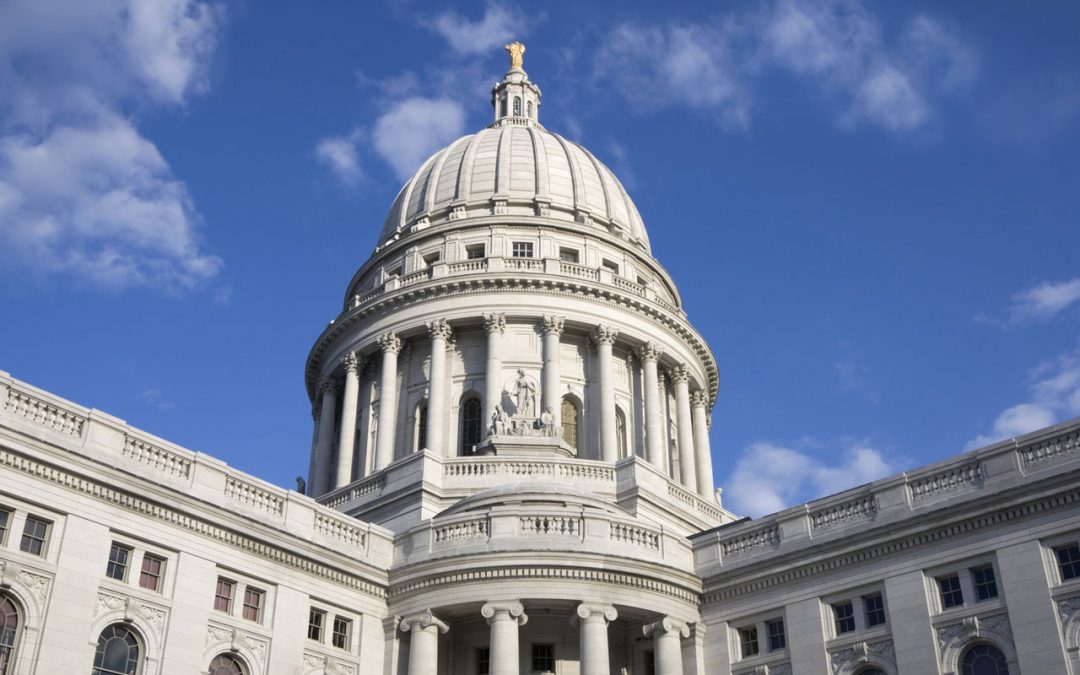
by Jim Boullion | Mar 18, 2022 | Advocacy, Community Solar, Electric Vehicles, Energy Storage, Legislative Watchlist, Local Government, Policy, Solar
The 2021-22 legislative session in Wisconsin is now over. It was a busy session for clean energy initiatives with legislation introduced to allow more community solar, clarify the rules for leasing solar equipment, and update the regulations for electric vehicle (EV) chargers. Most of these bills were bipartisan, with support on both sides of the aisle. See the bottom of this article for a summary of this year’s major clean energy legislation.
The session started when Governor Tony Evers introduced his 2021-23 Budget Bill in February 2021. It included 28 provisions (many of them drawn from the Governor’s Taskforce on Climate Change) that would have advanced Wisconsin’s clean energy and energy efficiency. Among those provisions were recommendations to expand Focus on Energy, invest in the clean energy workforce, and support Wisconsin’s electric vehicle infrastructure. Unfortunately, by the time the Governor signed the Budget in July, those provisions were removed from the Budget and did not pass.
On November 15, several Democratic legislators introduced a package of 22 bills called Forward on Climate. The package proposed increased funding for Focus on Energy, on-bill financing of energy efficiency improvements from utilities, and a Wisconsin Climate Corp to provide training and opportunities in clean energy industries for Wisconsin’s youth. The session ended without any of these bills being adopted. Still, it outlined what kinds of initiatives they support to create good, family-supporting jobs, reduce inequality, and fight climate change through Wisconsin-centered policies.
What passed and what progress was made?
The only major clean energy bill that passed this session was a bill to modernize the PACE financing program. However, many clean energy initiatives made in-roads with legislators from both sides of the aisle. The new technology developments and dropping prices for renewable energy over the last few years is an excellent story for reducing emissions, bolstering economic growth, diminishing energy prices, and creating jobs. Even if there are still hurdles to overcome, everyone is interested in learning more.
There is growing interest among a wide range of stakeholders in clean energy legislation. The best example is SB 490, the community solar bill, where many diverse interests have registered in support. While some groups have expressed concerns with the bill, most business and public interest groups who registered support this kind of change.
Even though we didn’t pass them this session, electric vehicle legislation is also getting attention, especially in light of the volatile gas prices this year. As the price of EV battery production falls, the initial price of EVs will get more competitive, making the cost of EV operations compared to petroleum-powered vehicles very attractive.
The EV transition is coming fast, and we need to be ready. We need to finalize the rules and regulations over EV charging, determine how to pay for the roads if the gas tax generates less income, and streamline the buying process for new EVs coming into the market. One of the big things happening in the coming year is the millions in federal Infrastructure Investment and Jobs Act money coming to Wisconsin for EV infrastructure. We need to work with all stakeholders to ensure that Wisconsin can utilize that money efficiently.
What happens next?
Over the summer and fall, RENEW Wisconsin will meet with candidates running for state and federal office. We will be educating them about new developments in clean energy and electric vehicles and discussing essential policy changes we need to make these advances available to everyone in Wisconsin.
You can also do your part by getting involved in your local elections, talking to your local candidates, and supporting the candidates who support clean energy with your votes, time, and financial contributions. This time of year, candidates are especially interested in what you have to say and will take the time to listen. Clean energy can have a big year in 2023, but only if we do the work this year to educate and help elect candidates who will support us!
If you would like information on any clean energy issues or the elections, please contact Jim Boullion, Director of Government Affairs, jim@renewwisconsin.org,
2021-22 Wisconsin Legislative Session
Clean Energy and Electric Vehicle Issue Summary
PACE Financing Modernization – (SB 692/Wisconsin Act 175 – Sen. Cowles and Rep. Thiesfeldt)
- Expands type of projects that may be financed: Adds energy reliability improvements, weather-related resiliency projects, electric vehicle charging infrastructure, and stormwater control measures.
- Financing: Defines the term of the repayment period, clarifies that financing may be repaid through a lien, and ensures that mortgage holders provide written consent before the issuance of funding.
- Performance Requirements: Removes the requirement for project savings to exceed project costs and would instead require a third-party assessment of the anticipated energy and water cost savings from the proposed project and confirmation of proper installation after work is completed.
- Excludes Residential PACE: Prohibits PACE financing for residential units of less than five units. PACE loans will remain only for commercial or industrial buildings.
Assembly: Passed on voice vote (2/23/2022) and sent to Governor for signature.
Senate: Passed 32-0 on 2/15/22.
RENEW Position: Support.
EV Charging Rules – (SB 573 – Sen. Cowles and Rep. VanderMeer) Clarify that selling electricity by the kilowatt-hour to electric vehicles (EVs) does not subject EV charging station owners to utility regulation. No city, village, town, county, school district, special purpose district, or state agency may own, operate, manage, lease or control a charging facility. Local governments can authorize a utility or private entity to operate a charger on their property. Requires that all energy come from the local utility, limiting Solar+Storage EV charger availability.
Senate: Passed on vote of 19-13 (2/15/2022). Did not concur with Assembly Amended bill 3/8/22
Assembly: Passed on voice vote, with amendment, (2/24/22). Failed to pass.
RENEW Position: Oppose due to restrictions on non-utility energy sources and restrictions on the State and local governments from owning or operating EV chargers.
Expanded Development of Community Solar – (SB 490 / AB 527 – Sen. Stroebel and Rep. Ramthun) Would authorize the development of non-utility-owned community solar projects, allowing more individuals and businesses to access clean energy, save money and create good-paying jobs. Require local investor-owned utilities (Cooperative and municipal utility territories would be exempt) to provide credits on utility bills of subscribers for the energy generated by the system. Directs the PSC to develop rules that will establish fair credit rates and compensation to utilities for the use of utility infrastructure and billing.
Assembly: Energy and Utilities. Failed to pass.
Senate: Utilities, Technology, and Telecommunications. Failed to pass.
RENEW Position: Support
3rd Party Financing/Leasing – (SB 702 / AB 731– Sen. Cowles and Rep. Cabral-Guevara) Clarify that 3rd party financing/leasing of renewable energy equipment is legal in Wisconsin.
Assembly: Energy and Utilities. Failed to pass.
Senate: Utilities, Technology, and Telecommunications. Failed to pass.
RENEW Position: Support
Energy Storage Sales Tax Exemption – (SB 672 /AB 710 – Sen. Cowles and Rep. Duchow) Clarify that battery storage devices installed as part of a renewable energy system should be included in the sales tax exemption for renewable energy system equipment.
Assembly: Committee on Ways and Means. Failed to pass.
Senate: Committee on Financial Institutions and Revenue. Failed to pass.
RENEW Position: Support
Use $10 million of VW Settlement Funds for EV Charging Station Grants – (SB 663/AB 695 – Sen. Cowles and Rep. VanderMeer) Grants from these funds will be used to install electric vehicle charging stations at key locations throughout Wisconsin. Requires the PSC and DOT to study how the growing number of EVs will impact the transportation fund and determine methods to ensure they contribute to that fund equitably. Grant recipients can only resell electricity obtained from the local electric utility. $5m for EV Corridors; $3m for businesses or multifamily; $2m to be determined by PSC.
Senate: Committee on Transportation and Local Government. Passed committee 5-0. Failed to pass.
Assembly: Committee on Energy and Utilities. Failed to pass.
RENEW Position: Support
Direct Purchase of Electric Vehicles – (SB 462 / AB 439 – Sen. Kooyenga and Rep. Neylon) Would enable electric vehicle manufacturers to deliver and service vehicles in Wisconsin using online sales or manufacturer-owned dealerships without going through a 3rd party dealership.
Senate: Senate Gov. Operations Committee. Passed Committee 4-1. Failed to pass.
Assembly: Committee on Transportation. Failed to pass.
RENEW Position: Support
Create a System to Measure Carbon Emissions for Animal Agriculture Operators. (SB1054 / AB 1072 – Sen. Cowles and Rep. Tauchen).
- DATCP shall establish voluntary and market-driven standards for quantifying the carbon emissions produced directly and indirectly from an animal agriculture operator’s activity.
- DATCP must facilitate trade in products and services related to transactions between animal agriculture operators and other parties for carbon emission offsets and may operate an electronic marketplace for selling and purchasing carbon emission offsets.
- PSC shall develop a statewide master plan for collecting, transporting, and commercializing renewable natural gas produced from animal wastes, biomass, and other organic sources.
- PSC will establish standardized power purchase agreements and standardized agreements for the provision of energy as a service between animal agriculture operators and electric utilities
Assembly: Committee on Energy and Utilities. Failed to pass.
Senate: Committee on Natural Resources and Energy. Failed to pass.
RENEW Position: Support
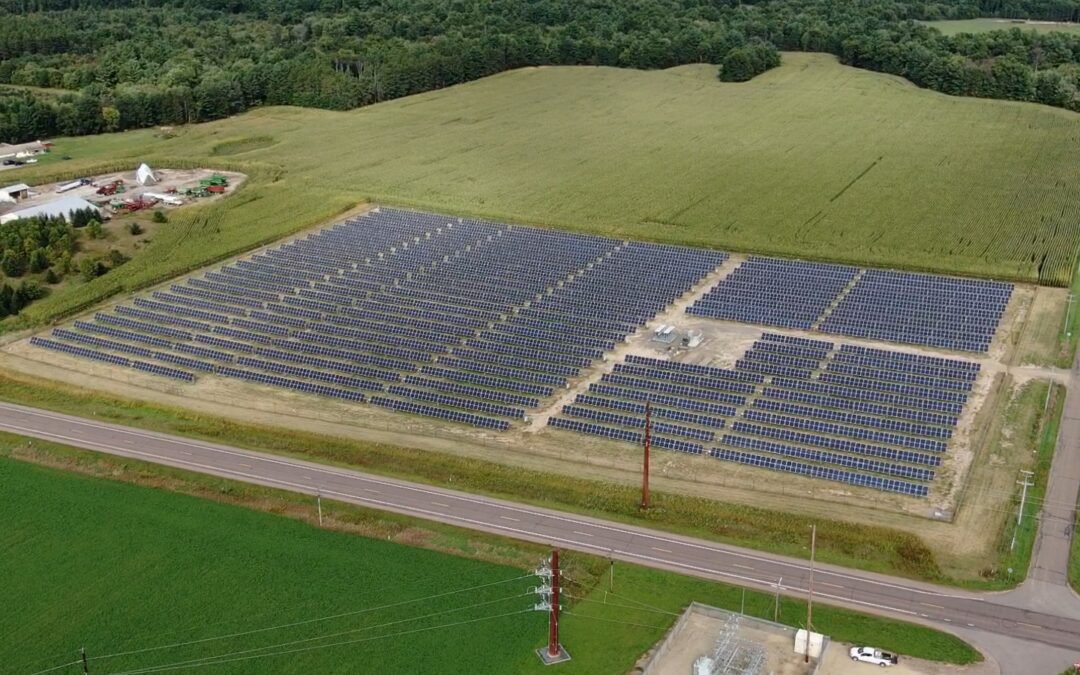
by Michael Vickerman | Oct 27, 2021 | Advocacy, Community, Community Solar, Local Government, Policy, RENEW Wisconsin, Renewables, Solar, Sustainability
For decades, utility investments in power plants and transmission lines have been predicated on the concept of economies of scale. The theory behind it is beguilingly simple: the larger the installation sought by an electric utility, the lower the unit cost of the investment, which utility planners and regulators regard as a measure of economic efficiency. When loads are growing, the “bigger is better” paradigm is often an economically rational fit for electric utilities seeking to recover large-scale capital investments in fossil generation over the broadest possible cohort of current and future customers.
But solar power, the default resource option for electric providers today, is a somewhat different animal due to its scalability. Yes, economies of scale can certainly reduce the unit price of solar generating capacity, but other on-the-ground factors can influence the economics of this resource. These factors include but are not limited to the cost of acquiring site control of the host properties and obtaining all the necessary approvals to construct the project. Interconnection costs can be high as well, especially for larger projects requiring additional land and approvals to supply power to the grid.
These thoughts came to mind after visiting two smaller solar farms that started producing power this year. The first project, called Strobus Solar, was developed by OneEnergy Renewables and serves Jackson Electric Cooperative. The second installation, O’Brien Solar Fields, was one of the stops in this September’s Ride with RENEW bicycle tour. Developed by EDF Renewables and owned by Madison Gas and Electric (MGE), this 20 MW solar farm in Fitchburg supplies electricity to seven MGE customers under long-term contracts.
At a Glance
Solar For the Distribution Grid – 2021 |
| Project name |
Strobus Solar |
O’Brien Solar |
| County of location |
Jackson |
Dane |
| Capacity (in MWac) |
1.5 |
20 |
| Project developer |
OneEnergy Renewables |
EDF Renewables |
| Project owner |
Greenbacker Capital |
Madison Gas + Electric |
| Utility territory |
Jackson Electric |
Madison Gas + Electric |
| General contractor |
Arch Electric |
Boldt Construction |
| Landowner |
Northern Family Farms |
O’Brien Brothers Farm |
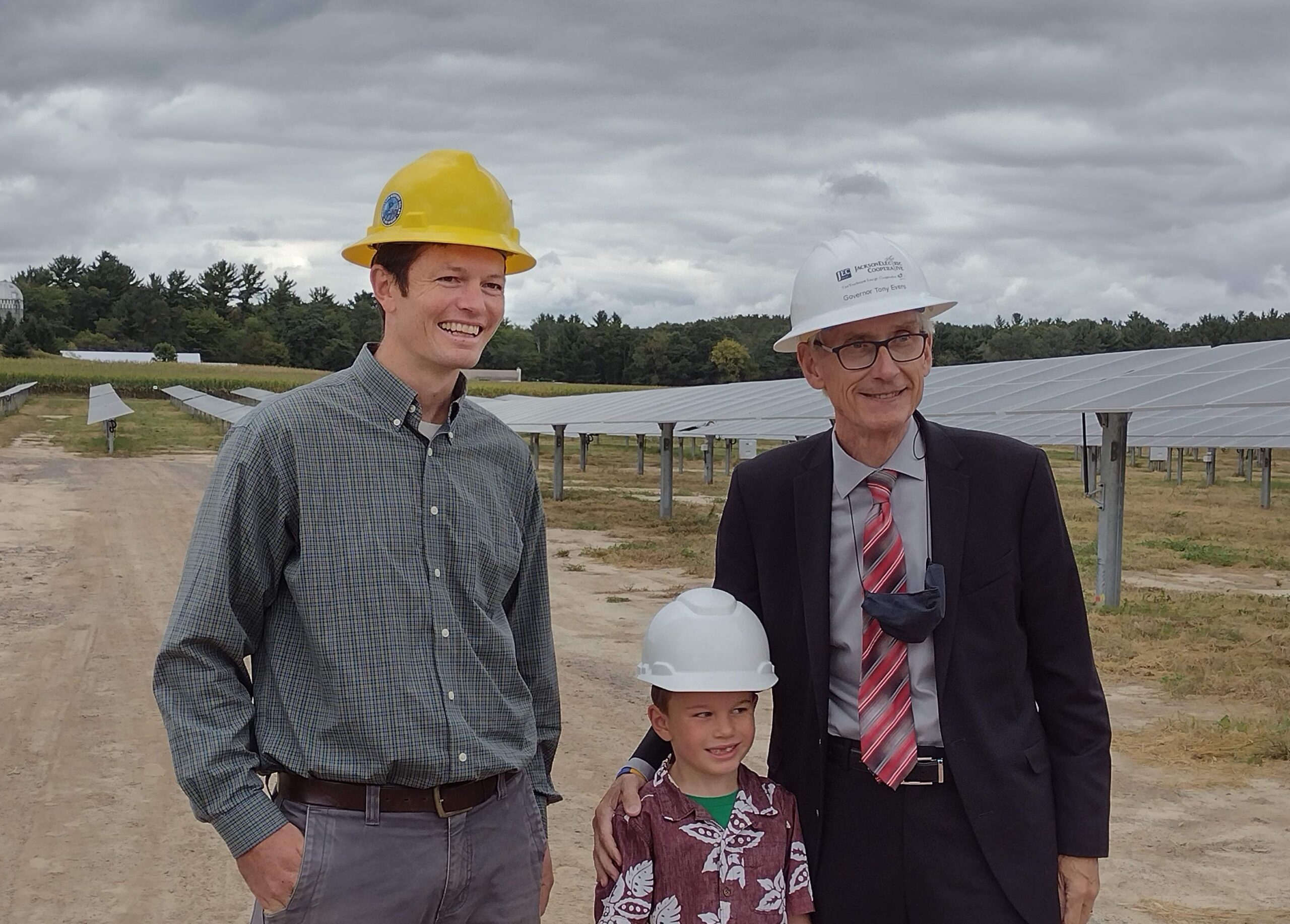 Governor Evers and the Project Developer, Eric Udelhofen, from OneEnergy Renewables at the Ribbon Cutting Ceremony for the Strobus Solar project.
Governor Evers and the Project Developer, Eric Udelhofen, from OneEnergy Renewables at the Ribbon Cutting Ceremony for the Strobus Solar project.
Strobus – A Mastodon Solar project
Occupying a mere 12 acres, Strobus Solar is located about six miles north of Black River Falls and is tucked into a compact parcel framed by evergreen trees and U.S. Highway 12. On a cloudy September day, more than 50 people attended a ribbon-cutting ceremony for the Strobus project, one of eight solar farms in southeast Minnesota and west-central Wisconsin that make up OneEnergy’s Mastodon Solar portfolio. With a combined 17 megawatts (MW) of AC-rated capacity, all eight Mastodon solar farms are located in the territory served by rural electric cooperatives.
As noted on OneEnergy’s website, “the electricity generated by each project will be purchased by the local participating electric cooperative, resulting in savings on energy supply and increased resiliency. These savings will be passed onto the cooperative’s members. The available Renewable Energy Credits will then be sold separately to visionary buyers committed to ensuring their renewable energy procurement dollars are devoted to new projects that serve local communities.”
Of the four Mastodon projects located in Wisconsin, Strobus is the second to be energized this year, following Blue Prairie, a 2.5 MW installation southwest of Black River Falls. The other two, Stromland and Shamrock, should be operating before the end of this year. Plymouth-based Arch Electric is the general contractor for all four Wisconsin projects.
Governor Evers spoke at the ribbon-cutting ceremony, along with representatives of Jackson Electric Cooperative, Arch Electric, and Northern Family Farms, the participating landowner. Based in nearby Merillan, Northern is Wisconsin’s largest Christmas tree grower, operating on more than 7,000 acres. After the prepared remarks, OneEnergy and Arch opened the gates to let Governor Evers and other guests circulate through the project and ask questions.
On one corner of the Strobus parcel is the substation that feeds the solar-generated electricity directly into the wires overhead. Though the equipment onsite is brand-new, low-growing grassy vegetation has already been established, covering the entire project footprint. After three years, the mix of deep-rooted, primarily native plants will provide a healthy habitat for birds, insects, and other species. At nearby Blue Prairie, sheep are already grazing around and under the 7,000 panels installed there.
Strobus is expected to generate about 3,000 megawatt-hours of electricity a year. But the Renewable Energy Credits associated with that output will not flow to Jackson Electric. They will instead be sold to Native, a Public Benefits Corporation, through its New Renewables Portfolio.
According to Native’s website, the purpose of the Portfolio “is to enable Renewable Energy Credit (REC) buyers to play a causal role in actualizing new renewable energy projects. Native has committed to a 10-year renewables purchase agreement with Strobus, LLC on behalf of Portfolio investors. Without this type of long-term REC purchasing agreement, this project would not be economically viable.”
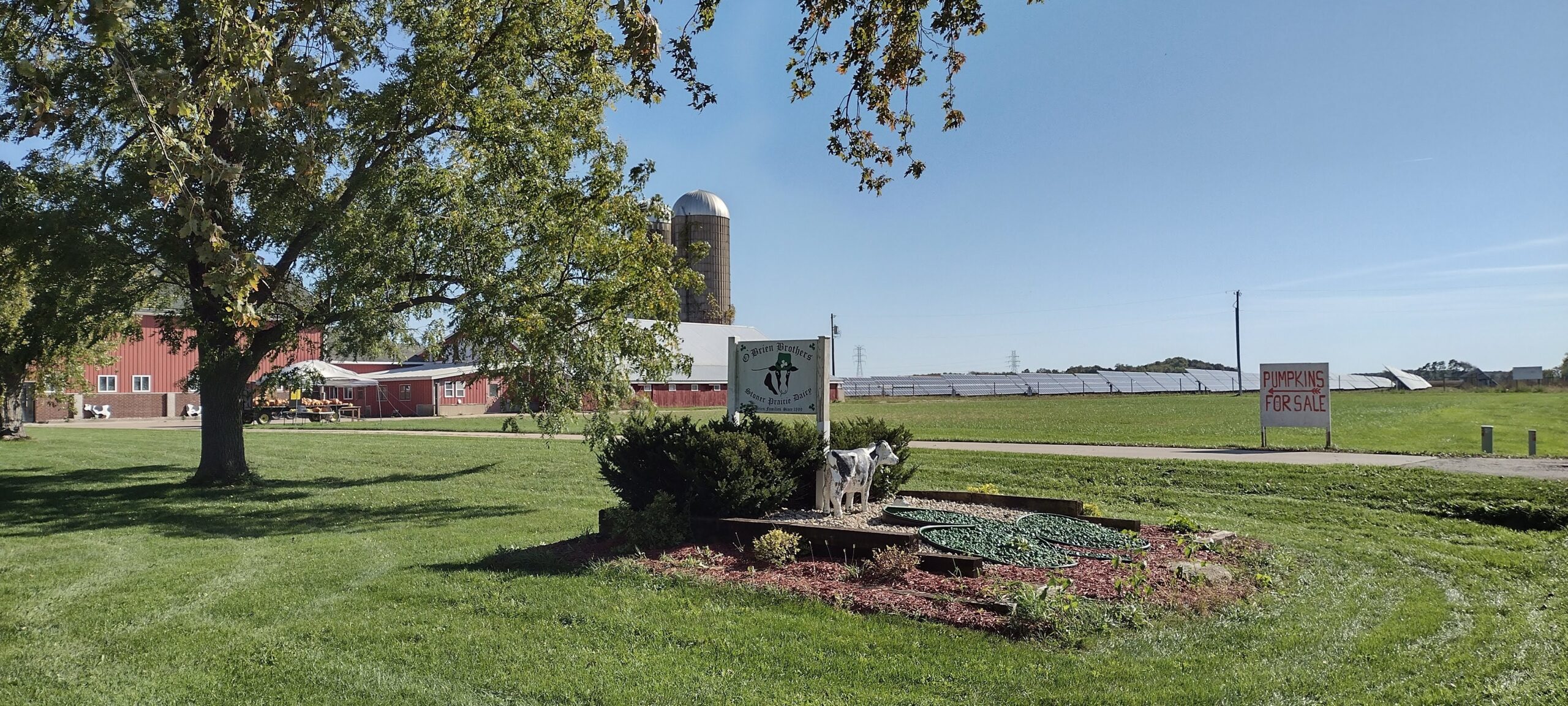 O’Brien Solar Fields in the city of Fitchburg, Wisconsin.
O’Brien Solar Fields in the city of Fitchburg, Wisconsin.
O’Brien Solar – Clean Energy Produced Offsite for Larger Customers
Occupying 130 acres along the edge of urban Fitchburg, O’Brien Solar Fields is as large as a distributed solar project gets. However, while every kilowatt-hour produced at O’Brien flows directly into Madison Gas and Electric’s distribution grid, only seven customers see the impact of this project on their utility bills. Those customers are the State of Wisconsin, University of Wisconsin-Madison, City of Fitchburg, Promega, Placon, Tribe 9 Foods, and Willy St. Co-op.
Energized this summer, O’Brien Solar is the newest Renewable Energy Rider (RER) project serving MGE customers. Several years ago, MGE received approval from the Public Service Commission (PSC) to build solar farms to serve individual customers, including those with multiple facilities, through its RER program. Unique to MGE, this service allows customers to be served by one larger solar farm instead of building numerous solar systems to supply each of their facilities.
A voluntary program, MGE’s RER program does not affect base electric rates. Participating customers fully absorb the cost of MGE’s investment in the solar arrays, and these costs are spread over 30 years. The electricity generated at O’Brien offsets grid power that would otherwise flow to these customers at specified prices throughout the contract term. Should standard electric rates rise faster than the agreed-upon pricing for O’Brien’s electricity, the savings will flow directly to the participating customers.
This unique model combines elements of both behind-the-meter generation and community solar power. But in order to entice customers to access brand-new yet low-cost sources of power, the project owner must design and develop projects that are competitive with the utility’s own avoided cost of power.
The question arises, what did MGE do to keep O’Brien’s development costs in line with its investments in larger solar projects and make it an affordable option for customers?
First, the project occupies only one parcel of land, the former Stoner Prairie Dairy owned and operated by the O’Brien brothers over several generations. Though the parcel is adjacent to a rapidly growing neighborhood, the project’s configuration allows the O’Brien family to maintain its most profitable farming operations as well as live in their long-time residence. Negotiating with only one landowner gives a developer more room in tailoring the project to avoid potentially expensive workarounds.
Second, from an electrical perspective, the project is divided into three zones, each with a separate interconnection to MGE’s feeder lines. By spreading out the project’s output in this fashion, MGE could forgo the more significant expense of running a large tie-in line to the closest substation.
Third, much like a 30-year residential mortgage, the RER contract is a powerful tool for breaking down a significant capital outlay into a manageable expense for the customer. Just as utilities rely on extended depreciation schedules to help them digest the costs of building central station power plants, the RER service provides a similar benefit to participating customers.
In the end, the all-in cost of O’Brien Solar Fields amounted to $29.5 million, which, on a unit basis, comes to $1,475 per kilowatt (kW). To put that number in perspective, the unit price of six larger solar farms totaling 414 MW that Alliant Energy proposes to acquire is $1,449 per kW. In fact, O’Brien’s unit cost is within 10% of the estimated cost of acquiring a 20 MW share of a project ten times as large.
Moreover, it took only three years for EDF Renewables, O’Brien’s original developer, and MGE to advance this power plant from the concept stage to fruition, a relatively speedy turnaround compared with larger solar installations.
Conclusion: The Policy Case for Smaller Solar Farms
Indeed, small solar farms can deliver affordable electricity at a reasonable price by avoiding the increased complexities and additional permitting hurdles associated with larger solar farms that tie into the transmission system. Moreover, while larger solar farms make a great deal of sense in areas rich in transmission infrastructure, relying solely on those locations would exclude much of Wisconsin from being able to host solar power.
There are many parcels of land throughout Wisconsin that have the requisite attributes for hosting projects on the scale of Strobus and O’Brien. In addition, projects of that size are ideal vehicles for community solar offerings, designed to deliver zero-carbon electricity to subscribing customers who cannot access solar power at their residence or business.
Over time, with increases in system power costs looking very likely, the state should explore and adopt policies to promote smaller solar farms within its boundaries. As exemplified by the Strobus and O’Brien projects, development on that scale can yield faster results at comparable costs while potentially providing a reliable revenue stream to the many thousands of landowners who don’t live near high-capacity transmission lines and substations.
Wisconsin is in the beginning stages of an energy revolution. With a more forward-looking policy framework, Wisconsin could emerge as a national leader in solar power. Embracing distribution-level solar solutions now will help more Wisconsinites participate in the benefits of these projects and give every city, town, and village a solar project to call their own. Wisconsin’s population is distributed throughout the state–our renewable energy portfolio should be as well.

by RENEW Wisconsin | Oct 26, 2021 | Advocacy, Community, Community Solar, Electric Vehicles, Events, Home, Jobs, Legislative Watchlist, Local Government, Policy, RENEW Wisconsin, Renewables, Solar, Sustainability
On October 13, RENEW Wisconsin and Wisconsin Conservative Energy Forum (WCEF) hosted their first-ever Renewable Energy Day at the Capitol in Madison. The event included issue briefings by industry experts on a variety of legislation that has been introduced this year related to the solar and electric vehicle industries. Attendees then went to the State Capitol to speak with their legislators to gain support for these important issues.
During a welcome reception, the evening before the Day at the Capitol, RENEW and WCEF held a panel discussion “Energy in Transition: Policy and Politics.”
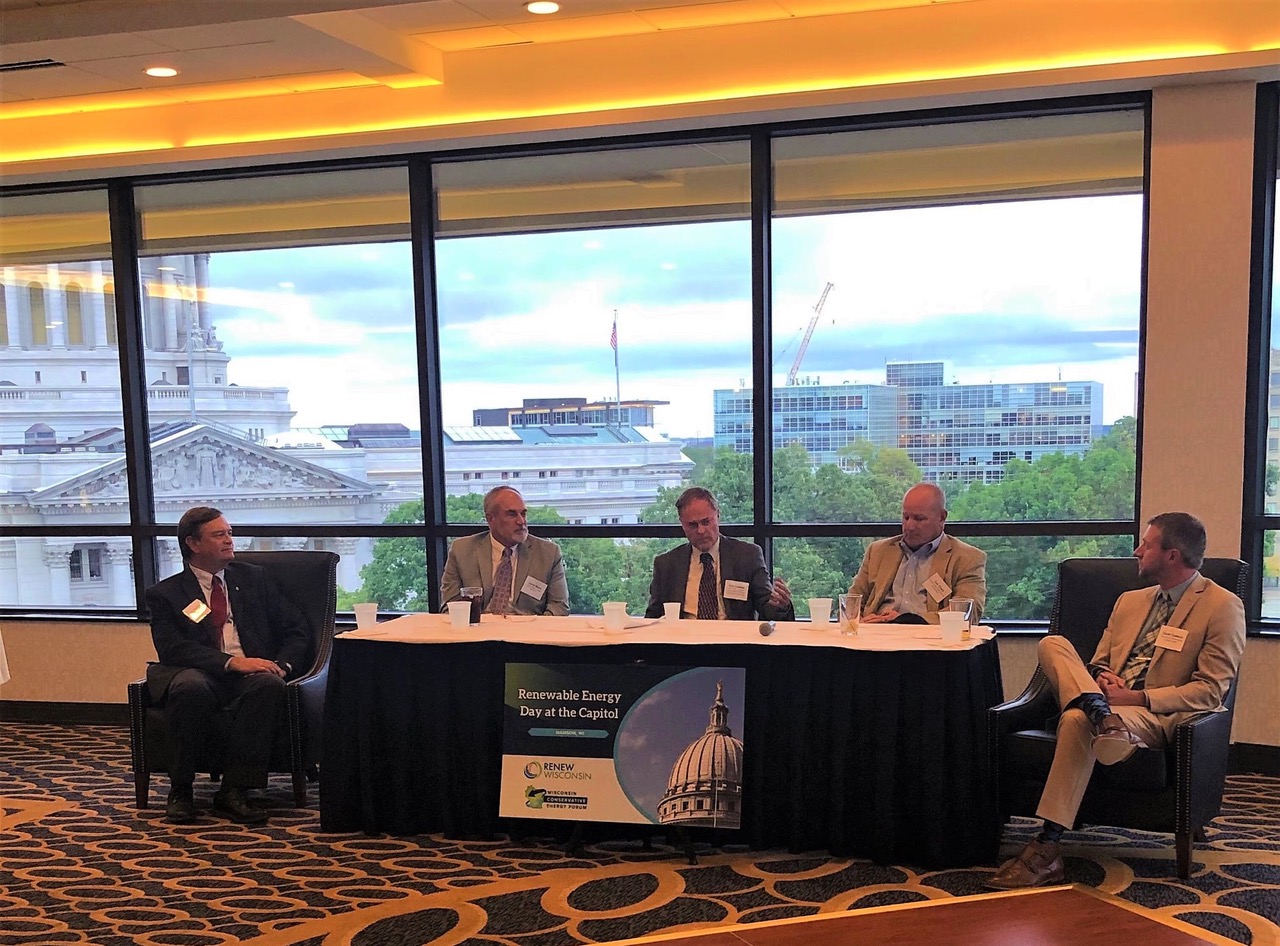
From right to left were moderator, Scott Coenen (WCEF), Dan Ebert (former PSC Chairman), Senator Rob Cowles, Larry Ward (Conservative Energy Network), and Jim Boullion (RENEW Wisconsin).
The panel discussed the current uncertainty in world energy markets and the impact that energy shortages and spiking prices will have on the world. There was consensus from the conversation that panelists believe renewables can help stabilize much of this energy uncertainty, but that the industry needs to be realistic about its role in a world where supply is not meeting demand. Businesses, households, and communities in Wisconsin should be empowered to invest in their own energy generation.
Before attendees went to the Capitol to meet with their legislators, there was an issue briefing with a panel of industry experts moderated by Jim Boullion, Director of Government Affairs for RENEW Wisconsin. The panelists explained in detail what legislative proposals were currently before the legislature, how they will impact renewable energy in Wisconsin, and what arguments are being made on both sides of the issue.
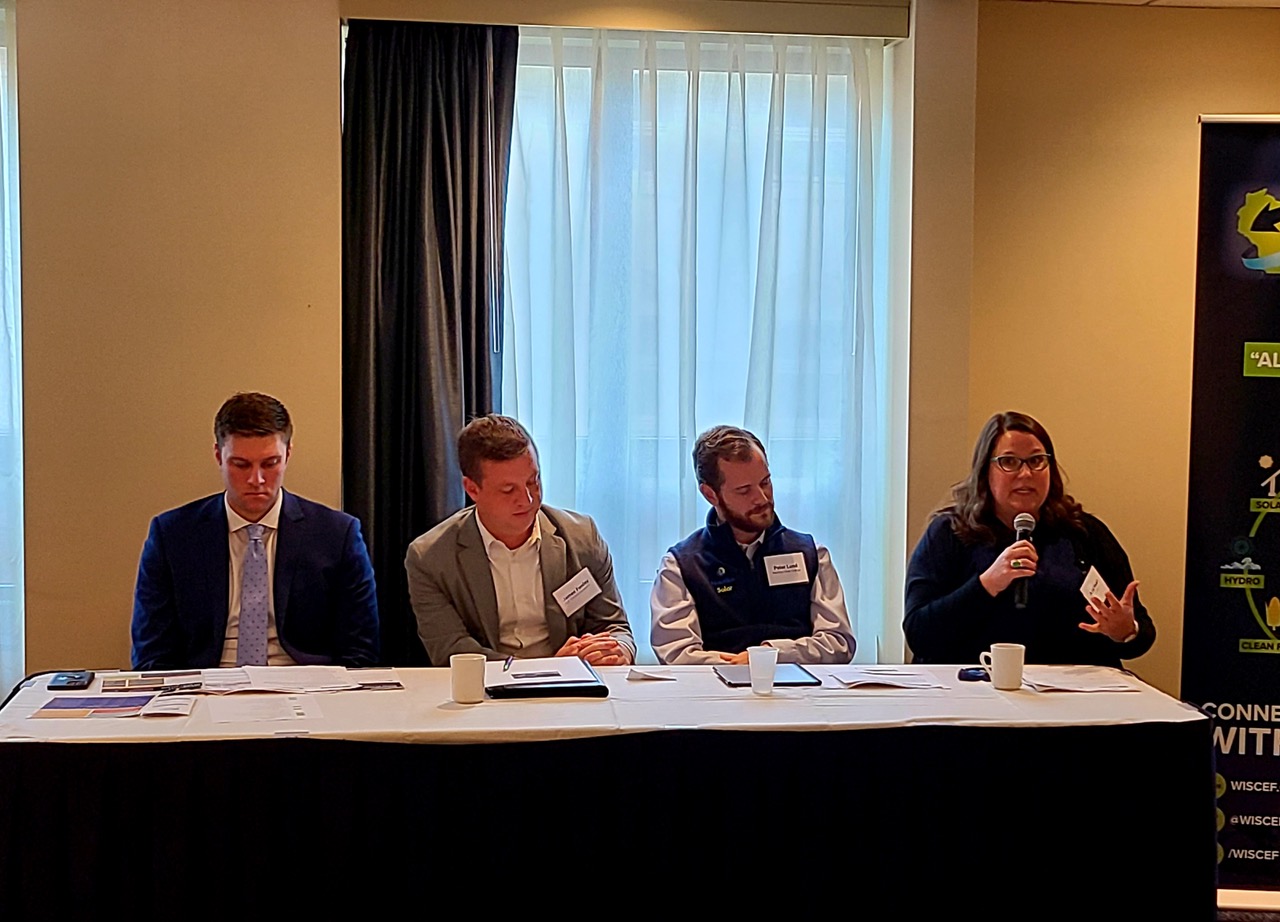
Issue briefing panelists, Left to right: Jason Mugnaini (Chief of Staff, State Senator Rob Cowles), James Fenley (SJL Government Affairs & Communications), Peter Lund (Financial Structuring Associate, Nautilus Solar Energy), and Amy Heart (Senior Director, Public Policy, Sunrun).
The first panel discussed two solar-related issues:
- Expanded Development of Community Solar – (SB 490 / AB 527 – Sen. Stroebel and Rep. Ramthun) This bill would authorize the development of non-utility owned community solar projects and provide access to the economic and environmental benefits of solar for those who can’t afford the full cost of a system, live in multi-family housing, or own property that is not suitable for solar.
- 3rd Party Financing/Leasing – (LRB 1550/1 Sen. Cowles and Rep. Cabral-Guevara) This legislation would clarify that 3rd party financing/leasing of renewable energy equipment is legal in Wisconsin, providing affordable financing options for people, businesses, municipalities, or not-for-profit entities who don’t have the resources to pay for solar on their own property.
The second panel, moderated by RENEW’s Jeremy Orr, Emerging Technology Program Manager, discussed electric vehicle issues such as Wisconsin’s recent Direct Electric Vehicle Sales legislation, SB 462 / AB 439 (Sen. Kooyenga and Rep. Neylon). Albert Gore, Policy and Business Development at Tesla, discussed how allowing manufacturers to sell electric vehicles directly to consumers creates greater access to the electric vehicle market, resulting in growth in the traditional dealership model. Read Jeremy Orr’s previous testimony on this issue here.
Likewise, Justin Ackley, Public Policy Manager at ChargePoint, spoke to the business clarity and consumer transparency that AB 588 / SB 573 (Sen. Cowles and Rep. VanderMeer) would provide, as it would allow non-utility-owned charging stations to charge by the kWh. Similar to a gas pump, where the price per gallon is displayed, kWh charging tells electric owners how much energy they’re paying for, regardless of how long it takes to charge their vehicle. The panel pointed out that while the main goal of this legislation is good, another section of it would create problems by prohibiting charging a fee if any of the electricity going through the EV charger comes from a non-utility source such as a solar+storage system.
Emerging technology allows EV chargers to be installed in areas, especially rural areas, that have inadequate grid infrastructure and can help limit costly spikes in energy “demand charges” for charging station owners. EnTech, a division of Faith Technologies based in Menasha, Wisconsin brought one of their portable solar+storage units to Capitol Square to demonstrate how the technology works and how flexible it can be. A similar system was set up at Bergstrom Ford in Neenah to help reduce the energy bills at their dealership. John Bergstrom, the owner of the dealership, told the story of why he worked with Faith Technologies to install the system in this podcast.
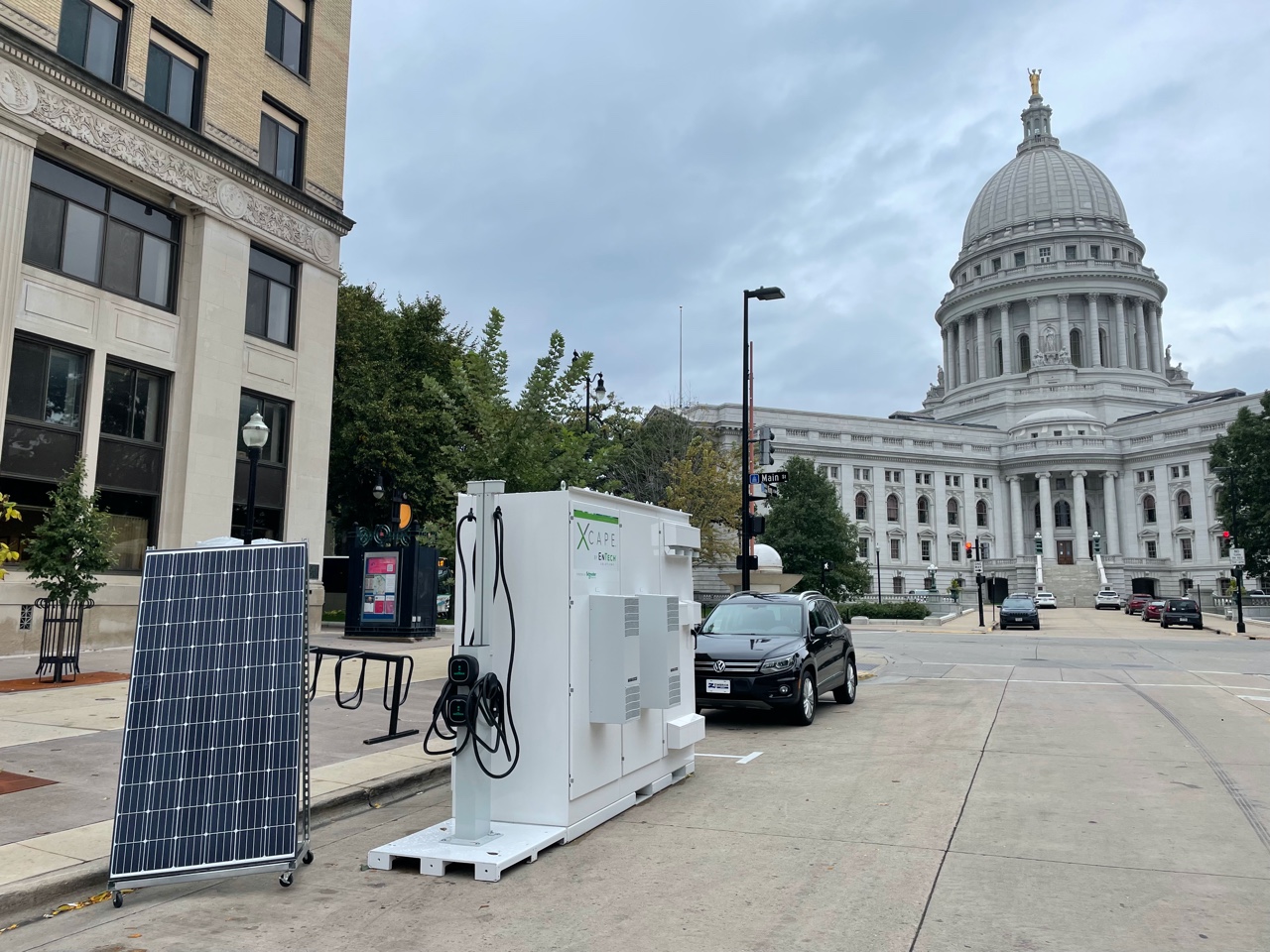
The panel closed the session by discussing two other bills recently introduced by Sen. Rob Cowles:
- $10 million in VW Settlement Funds for EV Charging Station Grants – (LRB-0254/1 Sen. Cowles and Rep. VanderMeer) Grants from these funds would be used to install electric vehicle charging stations at key locations throughout Wisconsin.
- Energy Storage Sales Tax Exemption – (LRB-1513/1) – Sen. Cowles and Rep. Duchow) This legislation would clarify that battery storage devices installed as part of a renewable energy system should be included in the sales tax exemption that already exists for renewable energy system equipment.
The 75 registered attendees made an impact by taking time out of their busy lives and getting involved in the political process. None of these issues will be easy to pass. In fact, most of them face significant opposition from powerful forces. But working together and building coalitions with pro-renewable energy friends helps get important legislation like this adopted.
If you would like to learn what you can do to help as well, contact Jim Boullion, Director of Government Relations at jim@renewwisconsin.org.














 Governor Evers and the Project Developer, Eric Udelhofen, from OneEnergy Renewables at the Ribbon Cutting Ceremony for the Strobus Solar project.
Governor Evers and the Project Developer, Eric Udelhofen, from OneEnergy Renewables at the Ribbon Cutting Ceremony for the Strobus Solar project. O’Brien Solar Fields in the city of Fitchburg, Wisconsin.
O’Brien Solar Fields in the city of Fitchburg, Wisconsin. 

